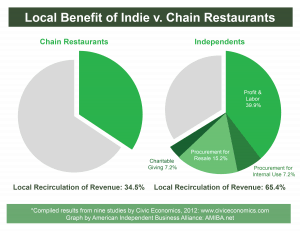
Some franchises seem to understand small towns, and others don’t. I suggest you look for local ideas instead. Photo by Becky McCray
One of your fellow readers wrote in to ask what franchises and chain restaurants know how to survive in small towns. His town with a population under 2,000 had a franchise pizza restaurant. The franchisee lived not only out of town, but actually out of state, really making ties to the community thin. Blaming the poor economy, the franchisee has closed the pizza place and pulled out.
“Where would you start in looking to recruit a new tenant for the building?” he asked. “Are there any particular national or regional franchises that seemingly know how to survive in rural, small town communities? I am at a loss to even know where to start.”
If you remember my advice on “Recruiting business to your small town” you won’t be surprised by the answer I gave him.
Why not to look for franchises and chains
 Forget about recruiting and franchises and chain eateries.
Forget about recruiting and franchises and chain eateries.
A franchisee who specifically builds strong ties to your town can be an excellent local asset. We have one in my town who I consider a terrific community member. I have shared the comments from one locally-involved franchise owner from Texas. He is definitely an asset to the communities he serves.
In my experience, such strong franchise holders are the exception, not the rule. You’re more likely to get an average franchisee who makes some contribution locally, but isn’t an outstanding “business citizen.” And their establishment will have a lot less economic benefit than an equivalent all-local eatery.
Take a look at the research. Independent restaurants generate twice as much local economic impact as chain restaurants. (Have you heard that franchises are more likely to succeed than independents? Independent research contradicts that claim. Apparently, any advantage is slim, at best.)
The very fact that it takes a lot of available cash to get started with any chain means that only the best-equipped (already well-off) people can even attempt it.
If someone local is in a position to secure a franchise and succeed, then by all means support them. But don’t go looking to recruit.
What to do instead
Instead, experiment your way into growing your own new eateries.
Where to start? Instead of one single full-scale restaurant, think of many tiny experiments.
These can be smaller, temporary, shared, mobile and creative ownership. (That should sound like the Innovative Rural Business Models, because it is.)
Here are a bunch of ideas to take advantage of that now-empty pizza restaurant in the town that asked for advice.
- Could you have a series of temporary restaurants?
- How about a series of community dinners, with pop-up restaurants?
- Or give a bunch of different aspiring restaurant owners a week each to try it out?
- Or let five different possible eateries each have one night a week?
- Or two eateries split the day, with one at breakfast, one for supper?
- Or share the space and have four different tiny specialized eateries at once?
- Or make the building a base for multiple food trucks to cover several nearby towns?
- Or have a community-owned cafe?
- Or an employee-owned eatery?
- Or a combination of all these?
Cut down the barriers to entry and let lots of local people try their crazy eatery ideas on a small scale. They’ll learn what works, what doesn’t, succeed and fail on a scale that won’t ruin them financially.
Spread the economic opportunity around
Instead of only benefiting the already well-off in other places, you’ll be benefiting people of more average means right in your own town. You’ll be allowing a lot more people to participate in ownership in your local economy. Profits will be more likely to stay local.
If one idea goes bust, you don’t lose the whole project. If several do only moderately well, that’s ok. If one really takes off and moves up to become a full-time restaurant in their own location, that is a huge win. No matter what, keep experimenting.
The best businesses to take your town into the future are in the dreams of your everyday local people right now. The question is whether you’ll focus your attention on helping them bring those dreams to life through small steps or if you’ll focus your attention on recruiting people from outside so that they can gain from your town.
New to SmallBizSurvival.com? Take the Guided Tour. Like what you see? Get our updates.











Allan Tinker shared this comment via email:
Where this article SHOULD be read is in the state EDC and commerce offices.
They keep trying to find large businesses to relocate in small communities with large tax support benefits and all sorts of taxpayer funded help. Then, when reality hits and these disappear, so do the businesses. This is really hard on the local taxpayers who are left to foot the tax burden and who were paying for the support of the infrastructure all along. We don’t need this type of “help.”
I have covered WAY TOO MANY EDC meetings where the entire meeting was focused on attracting a large business to town. In small towns, this just doesn’t work, and I keep trying to find an exception but this far, haven’t.
Thank you for the good work you are doing.